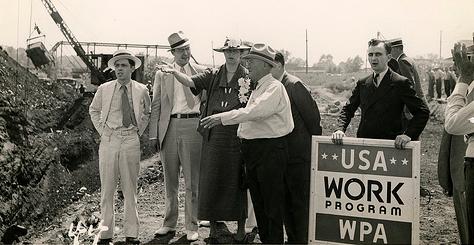Unemployment: 13.5%
Dow Jones Industrial Average: 187
Summary:
With Mellon's Death brought problems including undistributed tax profits, the fluctuation of bond prices. Businesses and investors refused to buy anymore money because they didn't want to use it. The Fed law, caused banks to cut back on loans and made stricter policies for banks. The Fed, fearing inflation from vast amount of gold pouring back into the economy, restricted the flow of gold into the economy which as a result removed billions of dollars from circulation and caused banks to lend fewer loans to the public. With the social security program taking out money to fund retired people and the Wagner act making bushiness much more expensive, the New Deal seemed inefficient. The massive drop in industrial production ever recorded helped support the ineffectiveness of the New Deal. During this time, Roosevelt was taking advice from a group of Anti-big businessmen, Corcoran, Cohen, Ickles, Jackson, and Hopkins to take advantage of the downturn and eliminate big businesses, urging the president to take action against the elite. The New Deal revealed the competition between the elite and the government and continued to support Roosevelt's opposition to holding companies and Wilkes support of private and holding companies .
Key Terms:
Civilian Conservation Corps
WPA
Agriculture Department
New Deal
Department of Commerce
Questions:
Where the programs and administrations that Roosevelt sponsored really helpful? What significant changes did they make?
What caused the depression within the depression in 1937?
Pictures:

Des Moines, Iowa June 8 1936, March 16 2015, http://www.fdrlibrary.marist.edu/archives/resources/newdealprojects.html
No comments:
Post a Comment